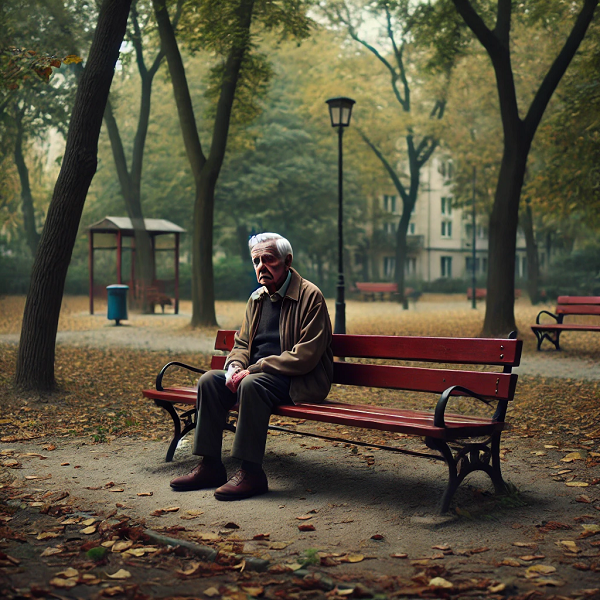Ageism: Is Society Really Out to Let the Elders Die?
In today’s society, ageism is not just a pesky little gnat buzzing around our collective consciousness; it’s a full-blown swarm that often goes unnoticed or, even worse, unaddressed. Ageism refers to discrimination and prejudice against older adults, and let’s be honest—if we were to treat any other group with such disregard, there would be a major outcry. Unfortunately, the elderly often find themselves at the receiving end of stereotypes that paint them as out-of-date, forgetful, or simply “too old” to contribute meaningfully to society. This kind of thinking can lead to serious consequences for their well-being and quality of life, not to mention a hefty dose of frustration for those who are young at heart but perhaps a tad slower on their feet.
As we dive into the world of ageism, it’s essential to understand its ramifications on the elderly population. Discrimination based on age can manifest in various ways, from workplace biases that prevent older adults from securing employment to healthcare practices that overlook their needs. Imagine being told you’re too old to apply for a job that requires “fresh ideas”—as if creativity has an expiration date These attitudes can lead to feelings of invisibility and worthlessness, which can be detrimental to mental and emotional health. After all, nobody wants to feel like they’ve been relegated to the sidelines simply because they’ve accumulated a few extra candles on their birthday cake.
In this article, we will delve into the concept of ageism, examining its impact on older adults and whether society is truly out to let the elderly die—or if it’s just a matter of overlooking the treasure trove of wisdom and experience they bring to the table. So, buckle up as we explore the ins and outs of ageism, and let’s see if we can shine a light on this important issue while having a bit of fun along the way. Because let’s face it—aging is inevitable, but ageism? That’s a choice, and it’s high time we choose to do better.
What is Ageism?
Ageism is like that unwelcome party crasher who shows up uninvited and refuses to leave—defined as prejudice or discrimination against individuals based on their age, it particularly targets older adults. This insidious form of bias can take many shapes, from the subtle to the downright outrageous. Picture this: you’re in a meeting, and your brilliant idea gets brushed aside because someone assumes you’re “past your prime.” Or maybe you find yourself at a doctor’s appointment, only to be met with dismissive comments about how “your generation just doesn’t understand modern health.” Newsflash: wisdom doesn’t come with an expiration date
Ageism manifests in various forms, including stereotyping, workplace discrimination, and neglect in healthcare settings. For instance, older workers may face barriers to hiring or promotions simply because of their age, despite their wealth of experience and skills. It’s as if society has decided that once you hit a certain age, your ability to contribute effectively just fades away like the remnants of a long-forgotten New Year’s resolution. In healthcare, this discrimination can lead to older adults receiving inadequate care, as their needs might be overlooked in favor of younger patients. After all, who has the time to listen to an elder’s chronic issues when the latest TikTok trend is just a click away?
The effects of ageism can have profound implications for the mental and physical health of older adults. Constant exposure to negative stereotypes can lead to feelings of isolation, low self-esteem, and a sense of worthlessness. Imagine waking up each day feeling like you’ve been put on the shelf, collecting dust instead of engaging in life’s adventures. This sense of disconnect can also decrease access to resources and opportunities, creating a vicious cycle that further entrenches ageism in society. It’s high time we recognize and challenge these harmful beliefs, because the truth is: that age is just a number, and the value of a person is defined by their experiences, not their birthdate.
The Impact of Ageism on the Elderly
Ageism isn’t just a nuisance; it can have serious consequences on the well-being of older adults, with effects that ripple through their physical and mental health. Research has shown that seniors who experience ageism are more likely to face poorer health outcomes, lower quality of life, and even higher rates of mortality. It’s like a double whammy—having to deal with the inevitable challenges of aging while also battling societal stereotypes that undermine their worth. Who knew that being judged by the number of candles on one’s birthday cake could lead to such dire consequences?
For instance, studies indicate that older adults subjected to ageist attitudes often report increased feelings of loneliness and depression. When society marginalizes them, it’s as if they’ve been handed an invisibility cloak—one that makes them feel excluded from social interactions and community engagement. Imagine a lively gathering where everyone is sharing stories and laughter, but you’re sitting in the corner, feeling like a relic from a museum exhibit. That kind of isolation can take a toll on mental health, leaving older adults feeling more like a forgotten book on a dusty shelf than the rich, engaging narratives they truly are.
Moreover, ageism can hinder access to essential resources and opportunities, making it even more difficult for older adults to maintain a fulfilling life. For instance, if they’re not seen as capable contributors in the workplace, they may miss out on job opportunities, stifling their sense of purpose and financial stability. In healthcare settings, ageist assumptions might lead to undertreatment or dismissive attitudes toward legitimate health concerns, putting their physical well-being at risk. After all, who wants to feel like they’re being treated as just another number rather than a valuable individual with a lifetime of experience?
In summary, the impact of ageism on the elderly can be profound and multifaceted, affecting everything from mental health to access to resources. It’s time we recognize the detrimental effects of these stereotypes and actively work to create a society that values and respects older adults. Because let’s be honest: aging may come with its challenges, but aging gracefully—while being treated with dignity and respect—is a journey that everyone deserves to experience.
Is Society Really Out to Let the Elders Die?
Now, before we don our tinfoil hats and start a conspiracy theory about society plotting against our beloved elders, let’s take a step back and examine the reality of the situation. While it may seem extreme to suggest that society is actively trying to let the elderly die, there are certainly systemic issues at play that contribute to the neglect and mistreatment of older adults. It’s less of a grand conspiracy and more of a series of unfortunate events—like a really bad sequel that no one wanted to see.
Take, for instance, the ageist attitudes that permeate the media. We’re constantly bombarded with messages that glorify youth and demonize aging, reinforcing the idea that getting older is something to be feared or avoided. Older adults are often portrayed as out-of-touch curmudgeons or fragile individuals waiting for their next nap, rather than vibrant, active members of society with rich histories and valuable experiences. This kind of representation can influence public perceptions and, in turn, affect how older adults are treated in everyday life. It’s no wonder they might feel like they’ve been cast in a poorly written drama where the hero is always young and the elderly are mere background characters.
Moreover, discriminatory practices in healthcare and social services create significant barriers for older adults seeking the care and support they need to thrive. Many healthcare providers harbor unconscious biases that lead them to overlook the needs of seniors, resulting in undertreatment or misdiagnosis. Picture an older adult visiting a doctor, only to be told that their aches and pains are just “part of getting old.” This kind of dismissive attitude can leave them feeling frustrated and helpless as if they’ve been sent to the back of the line in a waiting room that seems to stretch on forever.
Social services can also fall short, with resources often limited or difficult to access. For instance, programs designed to assist older adults may be underfunded or poorly promoted, leaving many unaware of the support available to them. This lack of access can lead to isolation and a sense of abandonment, making it feel as though society has turned its back on them.
In summary, while it’s not accurate to say that society is overtly trying to let elders die, it’s clear that systemic issues contribute to a cultural environment that neglects and marginalizes older adults. By addressing these attitudes and practices, we can create a society that values and supports its elderly, enabling them to live fulfilling and meaningful lives. After all, aging is a privilege, and everyone deserves to be treated with dignity and respect—no matter how many candles there are on their birthday cake.
Conclusion
Ageism is not just a minor inconvenience; it’s a pervasive issue that can have serious consequences on the well-being of older adults—think of it as the pesky fly in the ointment of society’s progress. By raising awareness about ageism and advocating for the rights and dignity of older adults, we can work together to create a more inclusive and supportive society for people of all ages. After all, if we can rally for the latest smartphone upgrade, surely we can advocate for the rights of those who have lived through decades of change and experience.
Challenging ageist attitudes and practices is essential. It’s time to ensure that older adults are not only heard but also celebrated for their contributions to society. They’ve weathered the storms of life, amassed wisdom, and often have stories that could rival any movie script. So why should we let stereotypes dictate their narrative? Let’s flip the script and remind ourselves that aging is not a curse but a blessing—a badge of honor that comes with a lifetime of knowledge and experience.
Together, we can combat ageism and create a more equitable and compassionate world for people of all ages. By fostering intergenerational connections, advocating for policies that protect the rights of older adults, and simply treating everyone with the respect they deserve, we can pave the way for a brighter future. So, the next time you encounter an older adult, remember they’re not just a “senior citizen” but a living testament to resilience and life’s adventures. Let’s celebrate that, and make ageism a thing of the past
#ageism #discrimination #prejudice #olderadults #society #healthcare #well-being #isolation #qualityoflife #mortality #ElderCare #SocialJustice #Aging #Society #Wisdom #SupportOurElders

